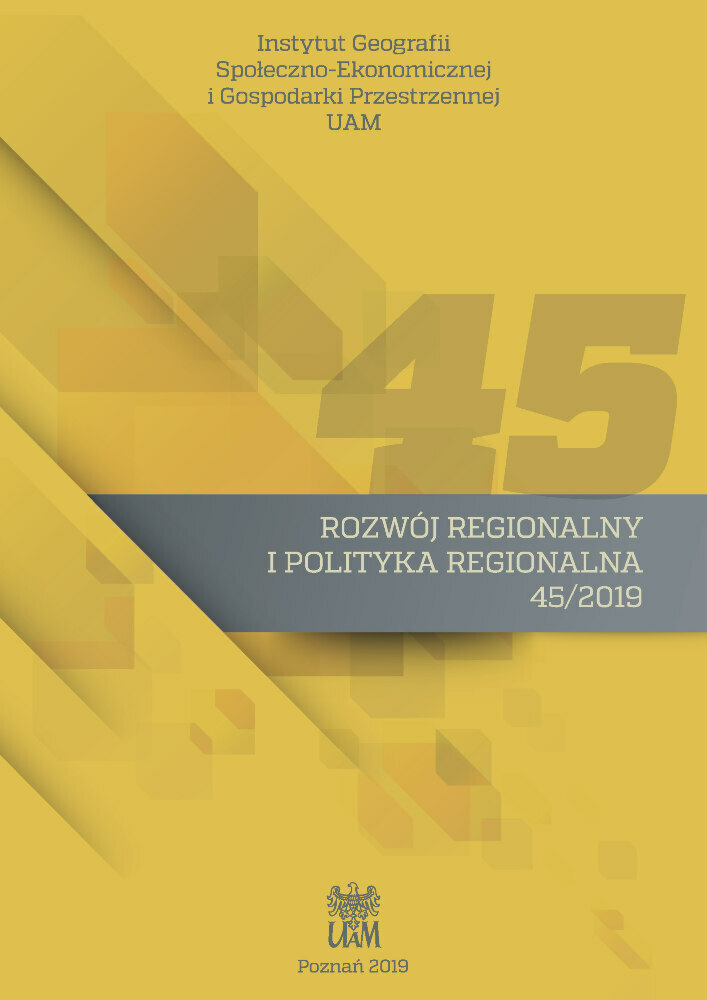Abstrakt
Parki naukowo-technologiczne (PNT) odgrywają coraz większą rolę w gospodarce opartej na wiedzy i przyczyniają się do zachodzenia istotnych przemian w środowisku innowacyjnym. Celem artykułu jest wskazanie miejsca, jakie zajmują w innowacyjnym środowisku regionalnym. Autorka rozpoczyna rozważania od przedstawienia krótkiej charakterystyki PNT, by kolejno przejść do opisu modeli ich funkcjonowania. Szczególne miejsce w artykule poświęcono analizie firm zorientowanych na tworzenie nowych technologii, które są lokalizowane w PNT. Autorka stara się wskazać, jak ich stale wzrastające znaczenie przyczynia się do zwiększenia dynamiki rozwojowej środowiska innowacyjnego. Jedną z konsekwencji tego działania jest poprawa efektywności lokalnej ekonomii, na której powinno zależeć wszystkim funkcjonującym na danym obszarze interesariuszom.
Bibliografia
Amin A. 1999, An Institutional Perspective on Regional Economic Development. International Journal of Urban and Regional Research, 23: 365–378.
Angulo-Cuentas G., Arenas Diaz P., Carballido L., Lizarazo M. 2013. Science and Technology Parks’ Characterization based on Their Business Model. Paper presented at the 22nd International Conference on Management of Technology (https://doi.org/10.13140/RG.2.1.4173.9689).
Annerstedt J. 2006. Science Parks and High-Tech Clustering. [W:] P. Bianchi, S. Labory (red.), International Handbook of Industrial Policy. Edward Elgar, Cheltenham, s. 279–297.
Błaszczyk M., Kwieciński L., Stawicka M., Wróblewski M. 2017. Parki technologiczne jako element regionalnej polityki wsparcia internacjonalizacji innowacyjnych firm sektora MŚP. Wyd. CeDeWu, Warszawa.
Błaszczyk M., Kwieciński L., Stawicka M., Wróblewski M. 2017. Przedsiębiorstwa w parkach technologicznych a paradygmat gospodarki opartej na wiedzy. Gospodarka Narodowa, 1: 69–94.
Carter N. 1989. Science Parks Development and Management. The Estates Gazette Limited London.
Cavallini S., Soldi R., Friedl J., Volpe M. 2016. Using the Quadruple Helix Approach to Accelerate the Transfer of Research and Innovation Results to Regional Growth. European Union.
Cieślik J. 2014. Przedsiębiorczość, polityka, rozwój. Wyd. Akademickie SEDNO, Warszawa.
Chądzyński J. 2013. Innowacje, sieci i środowisko innowacyjne a rozwój terytorium (http://dx.doi.org/10.18778/7525-954-4.07; dostęp: 16.01.2019).
Ferguson R., Olofsson Ch. 2004. Science Parks and the Development of NTBFs – Location, Survival and Growth. Journal of Technology Transfer, 29.
Grayson L. 1993. Science Parks: An Experiment in High Technology Transfer. The British Library London.
Huczek M. 2012. Środowisko innowacyjne źródłem rozwoju regionu. Zeszyty Naukowe Wyższej Szkoły Humanitas, 2. IASP (https://www.iasp.ws/Our-industry/Definitions; dostęp: 1.02.2019).
Jewtuchowicz A. 2005. Terytorium i współczesne dylematy jego rozwoju. Wydawnictwo Uniwersytetu Łódzkiego, Łódź.
Klaster Life Science Kraków. Łączymy naukę z biznesem (https://lifescience.pl/o-klastrze-lifescience/krajowy-klaster-kluczowy/; dostęp: 24.05.2019).
Kwieciński L. 2018. Polskie parki technologiczne – w stronę IV generacji parków technologicznych. Wstępne wyniki badań terenowych. Zarządzanie Publiczne, 1: 38–53.
Link A.N., Scott J.T. 2011. Research, Science and Technology Parks: Vehicles for Technology Transfer. University of North Carolina, Working Paper, 11–22: 3.
Maillat D. 2002. Globalizacja, terytorialne systemy produkcyjne i środowiska innowacyjne. Rector’s Lectures, 52. Akademia Ekonomiczna w Krakowie, Kraków. MamBiznes.pl (dostęp: 23.01.2019).
Marszałek A. 2007. Miejsce ideopolis w regionie uczącym się na przykładzie Krakowa. Wspólnoty Europejskie, 6: 32–37.
Monck C., Quintas P., Porter P., Storey D., Wynarczyk P. 1988. Science Parks and the Growth of High Technology Firms. Croom Helm, London.
Nauwelaers C., Kleibrink A., Stancova K. 2014. The Role of Science Parks in Smart Specialisation Strategies. JRC Technical Reports, European Commission.
Nauwelaers C. 2009. Challenges for the Design of Regional Innovation Policies: Lessons from Europe. [W:] P. Cooke, J. Osmond (red.), Regional Economies in a Globalising Economy: Enhancing Intellectual Capital and Innovation. Institute of Welsh Affaires, Cardiff.
Nowakowska A., Przygodzki Z., Sokołowicz M.E. 2011. Region w gospodarce opartej na wiedzy. Wyd. Difin, Warszawa.
OECD 2011. Regions and Innovation Reviews of Regional Policy. OECD Innovation, Paris.
Ośrodki innowacji i przedsiębiorczości w Polsce. Raport pod red. A. Bąkowskiego, M. Mażewskiej. Stowarzyszenie Organizatorów Ośrodków Innowacji i Przedsiębiorczości w Polsce.
Siegel D.S., Westhead P., Wright M. 2003. Science Parks and the Performance of New Technology-Based Firms: A Review of Recent U.K. Evidence and an Agenda for Future Research. Small Business Economics, 20: 178.
Singh J., Tucker D., House R. 1986. Organizational Legitimacy and the Liability of Newness. Administrative Science Quarterly, 31(2).
Stenberg R. 1990. The Impact of Innovation Centres on Small Technology-Based Firms: The Example of the Federal Republic of Germany. Small Business Economics, 2(2).
Storey D., Tether B. 1998. New Technology-Based Firms in the European Union: An Introduction. Research Policy, 26.
Ustawa z dnia 20 marca 2002 r. o finansowym wspieraniu inwestycji (Dz.U. z 2002 r., nr 41, poz. 363 z późn. zm.; dostęp: 17.01.2019).
Vilà P.C., Pagès J.L. 2008. Science and Technology Parks. Creating New Environments Favourable to Innovation. Paradigmes, s. 142.
Weresa M. 2014. Polityka innowacyjna. Wyd. PWN, Warszawa.
Westhead P., Wright M. 1998. Novice, Portfolio and Serial Founders: Are They Different? Journal of Business Venturing, 13.
Wróblewski M., Kwieciński L. 2016. Innowacyjność firm-lokatorów polskich parków technologicznych – wybrane wyniki badań terenowych. Ekonomia XXI wieku. Wyd. Uniwersytetu Ekonomicznego we Wrocławiu, Wrocław, s. 259–274.
Licencja
Copyright
© 2014 IGSEiGP, Uniwersytet im. Adama Mickiewicza w Poznaniu
OPEN ACCESS
